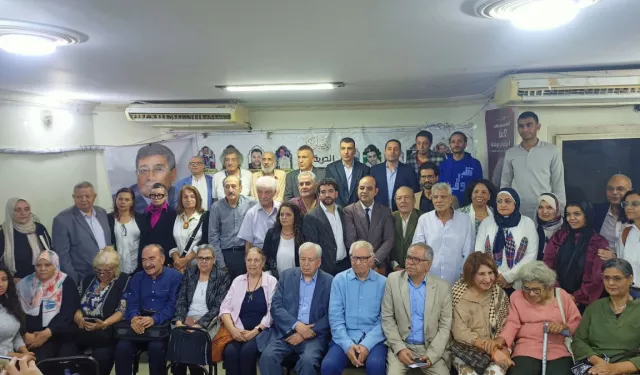More than 50 political parties, public figures, activists, and families of detainees have launched a new coalition under the banner “Egypt Without Prisoners of Conscience”, aiming to unify civic and legal efforts to secure the release of those imprisoned for political speech or activism.
Announced at a press conference Monday night at the headquarters of the Karama Party, the Committee to Defend Prisoners of Conscience declared its founding mission: to demand the immediate release of detainees held over free expression and public engagement, monitor prison conditions, and advocate for lawful, humane detention standards.
According to its founding charter , the committee will provide legal support to prisoners of conscience, receive reports of detention and enforced disappearance, and issue public updates on conditions inside detention facilities. It also plans to liaise with media outlets to build public awareness and pressure for change.
The statement emphasized that Egypt’s constitution guarantees freedom of opinion and expression and prohibits punitive action against citizens for their beliefs.
Ongoing pretrial detention of political prisoners, it added, constitutes a prolonged crisis affecting thousands of detainees and their families while deepening political repression and social tension.
The committee affirmed it will operate independently and objectively, relying solely on voluntary efforts from its members.
The Egyptian government vehemently denies the existence of “prisoners of conscience” or political prisoners within its detention facilities. Cairo maintains that all individuals currently in custody are being held legally to face trials on criminal or terrorism-related charges, asserting that the country upholds the rule of law and does not suppress political dissent.
During the launch event, families of detainees delivered emotional testimony. Educational researcher Kamal Mougheeth , father-in-law of imprisoned cartoonist Ashraf Omar , said Egypt is undergoing an unprecedented wave of political repression. “Egypt has known bloodthirsty rulers and self-serving regimes,” he said. “But what we are witnessing today surpasses all previous eras.”
“Even in Egypt’s harshest political eras, people weren’t jailed solely for their opinions—not even under Gamal Abdel Nasser’s rule,” Mougheeth added.
Ashraf Omar has been in pre-trial detention since his arrest on July 22, 2024, in case No. 1968/2024 under the jurisdiction of State Security. He faces charges of “spreading false news,” “misusing social media,” and “joining a group founded in violation of the law.”
The mother of detainee Sami El-Gendy, imprisoned over protests in solidarity with Palestine , condemned the authorities’ refusal to engage with families or respond to appeals. “My only son was my support,” she said. “Where are our rights? Where are his rights to live?”
Calling for the “return of freedom to Egypt,” she warned that the country is suffocating and on the verge of explosion. “We only want our children—and everyone imprisoned for their ideas—back home,” she said. She urged implementation of constitutional protections and prison regulations, noting that many families now fear even asking for basic rights.
“It is the middle class behind bars defending this country’s future,” declared Naglaa Salama, wife of detained economist Abdelkhalek Farouk . She called for a fundamental review of the state’s handling of political cases.
Mahmoud Attiya/Al Manassa
Naglaa Salama, wife of researcher and economic expert Abdelkhalek Farouk, speaks during the launch of the Committee for the Defense of Prisoners of Conscience at the Al-Karama Party HQ, Nov. 10, 2025. Farouk was arrested at his home on Oct. 20, 2024, and referred to State Security prosecutors. He faces charges of “joining and financing a terrorist group” and “spreading false information”. Rights groups have remarked that these charges were triggered by his publication of 40 articles criticizing government economic policies.
Laila Soueif, academic and mother of Alaa Abdel Fattah , a prominent activist jailed for more than a decade and recently released through presidential pardon after years of global appeals, was also present.
Laila stressed the need for coordinated, sustained action, arguing that gradual or selective releases of detainees are not a solution. “The fight for freedom of opinion must be organized and ongoing,” she said.
Former labor minister Kamal Abu Eita said the committee plans to expand political and grassroots participation while continuing to pursue legal avenues. He described the initiative as a snowball that will grow in size and force over time.
The committee would welcome participation from all parties, professional associations, and labor unions, with its structure expanding progressively, Abu Eita, told Al Manassa .
Opposition figure Ahmed Tantawy said the committee will form a board comprising party representatives, detainees’ families, and independent public figures. A media campaign will highlight the human stories behind the detentions.
Tantawy also proposed a symbolic act of solidarity, volunteer party leaders spending time in rooms simulating prison cells to draw attention to detainees’ daily suffering.
While an accurate number of political prisoners in Egypt is not publicly available, the Committee to Protect Journalists (CPJ) ranked Egypt sixth globally in 2024 for the number of jailed journalists. Seventeen were imprisoned that year.
CPJ described Egypt as “one of the world’s largest jailers of journalists,” far removed from the democratic hopes of the 2011 revolution.
Signatories to the founding statement included six political parties, among them the Karama Party and the Revolutionary Socialists. Fifty-four public figures also signed on, including former presidential candidate Hamdeen Sabahi, political science professor Gamal Zahran, and National Association for Change founder Abdel Galil Mostafa.
